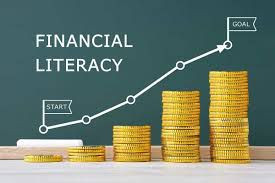EDUCATION
Five Basics of Financial Literacy Every Student Should Know
Five Basics of Financial Literacy Every Student Should Know

Financial literacy isn’t just about keeping a budget or balancing a checkbook—it’s about developing the skills to manage, grow, and protect your money throughout life. Mastering the fundamentals can make the difference between struggling financially and building lasting security.
Here are five essential concepts that form the foundation of financial wellness:
1. Credit and Debt
Credit and debt are powerful tools that can either help you achieve your goals or create long-term setbacks. The difference lies in how you use them.
- Debt as a tool: Borrowing isn’t always bad. Financing a home within your means or paying off a credit card on time can build a strong financial profile.
- Debt mismanagement: Missing payments or carrying high balances damages your credit score and can affect future opportunities for years.
- Credit scores matter: Lenders, landlords, and even some employers check your score. A strong credit history can open doors to better loan rates, housing options, and job prospects.
2. The Value of Time
When it comes to saving and investing, time is your greatest ally. The earlier you start, the more you benefit from compounding.
For example, two people might invest the same total amount, but the one who begins earlier will almost always end up with more because their money had more years to grow. Even modest contributions can snowball into substantial wealth if started early.
3. Inflation
Inflation reduces the purchasing power of your money over time. Keeping cash in a drawer or under the mattress might feel safe, but in reality, its value is shrinking each year.
To protect against inflation, money should be placed in savings or investments that earn interest or returns above the inflation rate. This ensures your wealth grows instead of losing value.
4. Rate of Return
When looking at your savings or investments, focus on the real rate of return—the amount your money grows after adjusting for inflation.
For instance, if you earn 6% interest but inflation is 1.5%, your true gain is 4.5%. This figure is what really counts in long-term financial planning, helping you measure whether your money is working hard enough.
5. Identity Theft and Financial Safety
Good money management isn’t just about spending and saving—it’s also about protecting your financial identity. In today’s digital age, identity theft is one of the fastest ways to derail financial progress.
Simple steps can help reduce risks:
- Use strong, unique passwords for online accounts.
- Consider a password manager for added security.
- Monitor bank and credit card statements regularly to spot suspicious activity.
Taking Control of Your Financial Future
Building financial literacy doesn’t happen overnight, but mastering these five basics puts you on the path to confidence and independence. By learning how credit works, starting early, protecting against inflation, understanding real returns, and keeping your identity safe, you’re laying the foundation for a secure financial future.
Discover more from 9jaPolyTv
Subscribe to get the latest posts sent to your email.

 EDUCATION22 hours ago
EDUCATION22 hours agoVisa Sponsorship Jobs Abroad for ND Graduates in Nigeria

 EDUCATION2 hours ago
EDUCATION2 hours agoOndo approves N350m for student scholarships, bursaries

 EDUCATION22 hours ago
EDUCATION22 hours agoAffordable Business Insurance for ND/HND Graduate Startups

 EDUCATION1 hour ago
EDUCATION1 hour agoOPay Extends N1.2 Billion Scholarship Fund to State University

 EDUCATION2 hours ago
EDUCATION2 hours agoFederal Polytechnics begin replacement of migrated, retired lecturers

 EDUCATION2 hours ago
EDUCATION2 hours agoExcessive reliance on AI undermines writing skills – National Librarian

 NEWS2 hours ago
NEWS2 hours agoKogi bans graduation ceremonies tertiary institutions

 EDUCATION22 hours ago
EDUCATION22 hours agoScholarships for Polytechnic Students to Study Online Courses


























